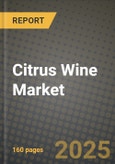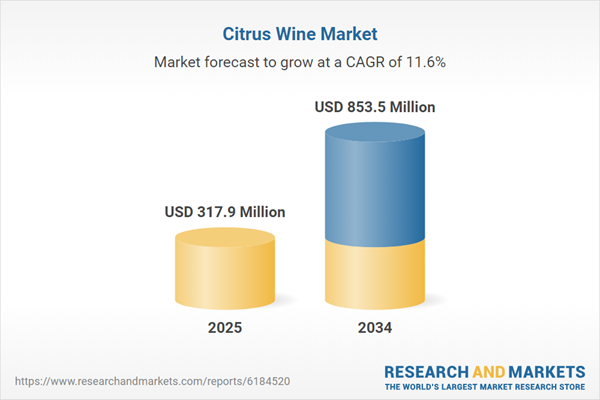Citrus Wine Market
The citrus wine market consists of fermented alcoholic beverages made from citrus fruits such as orange, lemon, lime, grapefruit, mandarin, yuzu and emerging exotics, positioned as an alternative to grape wine and as an extension of the broader fruit-wine and low-to-moderate alcohol segment. Demand is coming from consumers who want something fresher, more aromatic and more mixable than classic table wine, and from producers who want to valorize surplus or cosmetically imperfect citrus harvests. On the product side, still, lightly sparkling and fortified/cocktail-style citrus wines are all present, with flavor profiles often blended with botanicals, tropical fruits or herbs to smooth acidity. The main end-uses are specialty retail and e-commerce, tourism and tasting rooms, restaurants/bars that want citrus-based spritzes or sangria-style offerings, and private-label lines for modern trade. Current trends include premiumization with single-fruit or origin-specific citrus (Sicilian lemon, Valencia orange, Japanese yuzu), lower alcohol and RTD/canned formats, and cleaner labels with less added sugar. Market development is helped by the broader growth in fruit wines and flavored alcoholic beverages, and by F&B trendsetters pushing citrus and Asian citrus notes across beverages. Key constraints remain: seasonality and supply concentration in citrus regions, the need for careful acid/sugar balance and stability, and regulatory positioning in countries where “wine” is still legally tied to grapes. Producers that offer consistent quality, attractive packaging, and channel-specific SKUs (on-premise vs retail) will capture the rising lifestyle and gifting demand.Citrus Wine Market Key Insights
- Fruit-wine acceptance is opening doors. As consumers grow comfortable with berry and tropical fruit wines, it becomes easier to position citrus wines on the same shelf or in the same online category.
- Flavor innovation is the main differentiator. Blood orange, yuzu, calamansi, pomelo and blends with herbs or tea help brands stand out and connect to cocktail culture.
- Low-ABV and refreshment positioning. Many launches stay in a moderate alcohol band to target daytime, poolside and food-pairing occasions that traditional wine sometimes misses.
- Upcycling and local sourcing stories add value. Linking the product to local citrus farms, reduction of food waste and regional identity resonates with premium and tourism buyers.
- Format flexibility accelerates trial. Cans, small bottles and sparkling variants let retailers and bars test the category without committing to large volumes and suit outdoor events.
- Technical control is crucial. Managing citrus acidity, residual sugar and clarity is essential to avoid batch-to-batch variability and to keep shelf life acceptable for export.
- Channel-led growth. Tasting rooms, tourist estates, beach bars and themed restaurants can hand-sell citrus wine, then migrate repeat customers to e-commerce.
- Regulatory positioning matters. In markets with strict wine definitions, calling the product fruit wine or flavored alcoholic beverage ensures smoother approvals and wider distribution.
- Partnerships with mixology and RTD players. Using citrus wine as a base for spritz, sangria-style and ready-to-serve cocktails creates incremental B2B demand.
- Lifestyle branding over terroir. Because citrus wine is younger as a category, brands win more with clear lifestyle cues, food pairing and usage ideas than with complex oenological language.
Citrus Wine Market Reginal Analysis
North America
Craft wineries, farm-based producers and fruit-wine specialists are adding citrus SKUs to capture summer, brunch and tourism traffic. On-premise operators use citrus wine for spritzes and sangria because it shortens prep time and keeps flavor consistent. E-commerce and direct-to-consumer help small brands reach buyers outside their state.Europe
Mediterranean citrus supply and strong food-tourism flows support premium, origin-linked citrus wines, often sold at estates, resorts and specialty shops. Producers pay attention to sugar-acid balance and to labeling so they can sell both to tourists and to modern retail chains. Aperitivo and ready-to-spritz positioning works well in southern markets.Asia-Pacific
Consumers are already familiar with yuzu, sudachi and other high-aroma citrus, so citrus wine can be placed close to flavored alcoholic drinks and RTDs. Japan, Korea, Australia and parts of Southeast Asia are experimenting with low-ABV, sparkling and canned formats that suit convenience and online channels. Local citrus varieties give strong storytelling.Middle East & Africa
In markets where alcohol is permitted, hotels, resorts and beach venues look for refreshing, fruit-forward drinks suited to hot climates, making citrus wine a useful addition to imported wine lists. Shelf-stable, attractive packaging and clear product descriptions are important for tourist-heavy outlets.South & Central America
Large orange and lime production allows local players to turn surplus fruit into value-added beverages for coastal tourism, restaurants and modern retail. Price-sensitive consumers will try citrus wine when it is positioned close to flavored wines and wine coolers, while premium city outlets can offer origin or varietal citrus lines.Citrus Wine Market Segmentation
By Application
- Commercial
- Household
By Sales Channel
- Online
- Offline
By Citrus Fruits
- Orange
- Grapefruit
- Lemon
- Lime
- Others
Key Market players
E. & J. Gallo Winery, Constellation Brands Inc., The Wine Group, Treasury Wine Estates, Pernod Ricard S.A., Accolade Wines, Castel Frères, Casella Family Brands (Yellow Tail), Viña Concha y Toro S.A., Changyu Pioneer Wine Co. Ltd., Great Wall Wine Co. Ltd., Bronco Wine Company, Sula Vineyards, Grover Zampa Vineyards, Torres S.ACitrus Wine Market Analytics
The report employs rigorous tools, including Porter’s Five Forces, value chain mapping, and scenario-based modelling, to assess supply-demand dynamics. Cross-sector influences from parent, derived, and substitute markets are evaluated to identify risks and opportunities. Trade and pricing analytics provide an up-to-date view of international flows, including leading exporters, importers, and regional price trends.Macroeconomic indicators, policy frameworks such as carbon pricing and energy security strategies, and evolving consumer behaviour are considered in forecasting scenarios. Recent deal flows, partnerships, and technology innovations are incorporated to assess their impact on future market performance.
Citrus Wine Market Competitive Intelligence
The competitive landscape is mapped through proprietary frameworks, profiling leading companies with details on business models, product portfolios, financial performance, and strategic initiatives. Key developments such as mergers & acquisitions, technology collaborations, investment inflows, and regional expansions are analyzed for their competitive impact. The report also identifies emerging players and innovative startups contributing to market disruption.Regional insights highlight the most promising investment destinations, regulatory landscapes, and evolving partnerships across energy and industrial corridors.
Countries Covered
- North America - Citrus Wine market data and outlook to 2034
- United States
- Canada
- Mexico
- Europe - Citrus Wine market data and outlook to 2034
- Germany
- United Kingdom
- France
- Italy
- Spain
- BeNeLux
- Russia
- Sweden
- Asia-Pacific - Citrus Wine market data and outlook to 2034
- China
- Japan
- India
- South Korea
- Australia
- Indonesia
- Malaysia
- Vietnam
- Middle East and Africa - Citrus Wine market data and outlook to 2034
- Saudi Arabia
- South Africa
- Iran
- UAE
- Egypt
- South and Central America - Citrus Wine market data and outlook to 2034
- Brazil
- Argentina
- Chile
- Peru
Research Methodology
This study combines primary inputs from industry experts across the Citrus Wine value chain with secondary data from associations, government publications, trade databases, and company disclosures. Proprietary modeling techniques, including data triangulation, statistical correlation, and scenario planning, are applied to deliver reliable market sizing and forecasting.Key Questions Addressed
- What is the current and forecast market size of the Citrus Wine industry at global, regional, and country levels?
- Which types, applications, and technologies present the highest growth potential?
- How are supply chains adapting to geopolitical and economic shocks?
- What role do policy frameworks, trade flows, and sustainability targets play in shaping demand?
- Who are the leading players, and how are their strategies evolving in the face of global uncertainty?
- Which regional “hotspots” and customer segments will outpace the market, and what go-to-market and partnership models best support entry and expansion?
- Where are the most investable opportunities - across technology roadmaps, sustainability-linked innovation, and M&A - and what is the best segment to invest over the next 3-5 years?
Your Key Takeaways from the Citrus Wine Market Report
- Global Citrus Wine market size and growth projections (CAGR), 2024-2034
- Impact of Russia-Ukraine, Israel-Palestine, and Hamas conflicts on Citrus Wine trade, costs, and supply chains
- Citrus Wine market size, share, and outlook across 5 regions and 27 countries, 2023-2034
- Citrus Wine market size, CAGR, and market share of key products, applications, and end-user verticals, 2023-2034
- Short- and long-term Citrus Wine market trends, drivers, restraints, and opportunities
- Porter’s Five Forces analysis, technological developments, and Citrus Wine supply chain analysis
- Citrus Wine trade analysis, Citrus Wine market price analysis, and Citrus Wine supply/demand dynamics
- Profiles of 5 leading companies - overview, key strategies, financials, and products
- Latest Citrus Wine market news and developments
Additional Support
With the purchase of this report, you will receive:- An updated PDF report and an MS Excel data workbook containing all market tables and figures for easy analysis.
- 7-day post-sale analyst support for clarifications and in-scope supplementary data, ensuring the deliverable aligns precisely with your requirements.
- Complimentary report update to incorporate the latest available data and the impact of recent market developments.
This product will be delivered within 1-3 business days.
Table of Contents
Companies Mentioned
- E. & J. Gallo Winery
- Constellation Brands Inc.
- The Wine Group
- Treasury Wine Estates
- Pernod Ricard S.A.
- Accolade Wines
- Castel Frères
- Casella Family Brands (Yellow Tail)
- Viña Concha y Toro S.A.
- Changyu Pioneer Wine Co. Ltd.
- Great Wall Wine Co. Ltd.
- Bronco Wine Company
- Sula Vineyards
- Grover Zampa Vineyards
- Torres S.A
Table Information
| Report Attribute | Details |
|---|---|
| No. of Pages | 160 |
| Published | November 2025 |
| Forecast Period | 2025 - 2034 |
| Estimated Market Value ( USD | $ 317.9 Million |
| Forecasted Market Value ( USD | $ 853.5 Million |
| Compound Annual Growth Rate | 11.6% |
| Regions Covered | Global |
| No. of Companies Mentioned | 15 |









